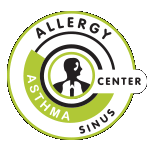CHILDREN & ASTHMA
What is asthma?
Asthma is an inflammation of the bronchial tubes that makes the airways irritable. These airways narrow in response to certain environmental changes or substances in the air, which makes it harder for air to travel in and out of the lungs. Not all cases of asthma are related to allergies, but in many cases, asthma attacks are brought on by an allergy to airborne particles and occasionally to food and medicines. Regardless of the cause, an asthma attack can be a very frightening event for a child!
Among children in the United States, asthma is the most common chronic illness, causing wheezing, chest tightness, and/or shortness of breath.
Consult a board-certified allergist if your child has one or more of these symptoms:
- coughing while exercising or after exercise
- shortness of breath
- wheezing
- a tight feeling in his or her chest
- coughing at night that disrupts his or her sleep
What causes asthma?
Allergens, irritants, respiratory infections, and/or exercise can trigger asthma symptoms. Asthma is often placed in different categories according to symptom “triggers.”
For example:
- Allergic asthma is triggered by allergic reactions to perennial (year-round) allergens such as pet dander, dust or dust mites, mold, or pollen.
- Seasonal asthma is triggered by allergic reactions to seasonal allergens such as tree pollen, grasses, or weeds.
- Non-allergic asthma is triggered by irritants in the air such as tobacco smoke, wood smoke, room deodorizers, fresh paint, perfume, etc.
- Exercise-induced asthma is triggered by exercise or physical activity.
- Nocturnal asthma can occur in a patient with any type of asthma who experiences severe symptoms at night.
How is childhood asthma treated?
Though no cure for asthma exists, your child’s symptoms can be controlled with medication and trigger avoidance. The first step is to get an accurate diagnosis from a board-certified allergist. Knowing the precise cause of his or her asthma will equip both you and your child with valuable information.
What happens if my child's asthma goes untreated?
It is extremely important to seek medical attention for asthma. Airway inflammation is likely to occur more often and become more severe the longer asthma goes untreated. Asthma is not a medical condition that goes away. Not treating asthma can cause your child to lose his or her lung function, which means your child will not be able to breathe properly; therefore, seeking medical care for asthma is imperative.
The good news? Just like adult asthma, childhood asthma can be treated and managed effectively so that your child can grow, play, and learn freely.
TRUST THE EXPERTS
All physicians board-certified in allergy and immunology

All Rights Reserved | The Allergy, Asthma & Sinus Center
